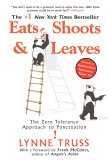Summary | Excerpt | Reviews | Beyond the Book | Readalikes | Genres & Themes | Author Bio

Critics' Opinion:
Readers' Opinion:
First Published:
Apr 2004, 240 pages
Paperback:
Apr 2006, 240 pages
 Book Reviewed by:
Book Reviewed by:
BookBrowse Review Team
Buy This Book
To be fair, many people who couldn't punctuate their way out of a paper bag are still interested in the way punctuation can alter the sense of a string of words. It is the basis of all "I'm sorry, I'll read that again" jokes. Instead of "What would you with the king?" you can have someone say in Marlowe's Edward II, "What? Would you? With the king?" The consequences of mispunctuation (and re-punctuation) have appealed to both great and little minds, and in the age of the fancy-that email a popular example is the comparison of two sentences:
A woman, without her man, is nothing.
A woman: without her, man is nothing.
Dear Jack,
I want a man who knows what love is all about. You are generous, kind, thoughtful. People who are not like you admit to being useless and inferior. You have ruined me for other men. I yearn for you. I have no feelings whatsoever when we're apart. I can be forever happy – will you let me be yours?Dear Jack,Jill
I want a man who knows what love is. All about you are generous, kind, thoughtful people, who are not like you. Admit to being useless and inferior. You have ruined me. For other men I yearn! For you I have no feelings whatsoever. When we're apart I can be forever happy. Will you let me be?Yours,
Jill
Every Lady in this Land
Hath 20 Nails on each Hand;
Five & twenty on Hands and Feet;
And this is true, without deceit.
It is under these circumstances that we feel constrained to call upon you to come to our aid should a disturbance arise here the circumstances are so extreme that we cannot but believe that you and the men under you will not fail to come to the rescue of people who are so situated.
Reprinted from Eats, Shoots & Leaves by Lynne Truss by permission of Gotham Books, a member of Penguin Group (USA) Inc. Copyright © Lynne Truss, 2003. All rights reserved. This excerpt, or any parts thereof, may not be reproduced without permission.





The Funeral Cryer by Wenyan Lu
Debut novelist Wenyan Lu brings us this witty yet profound story about one woman's midlife reawakening in contemporary rural China.
Your guide toexceptional books
BookBrowse seeks out and recommends the best in contemporary fiction and nonfiction—books that not only engage and entertain but also deepen our understanding of ourselves and the world around us.